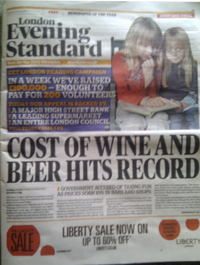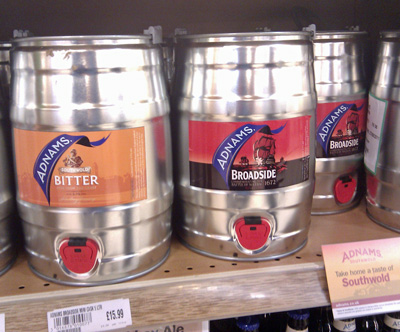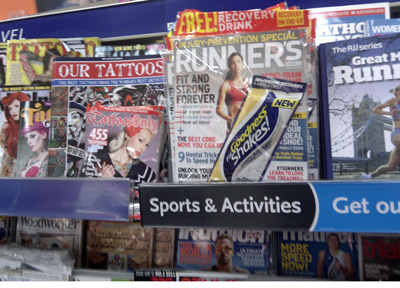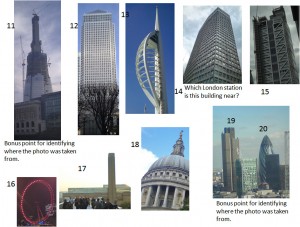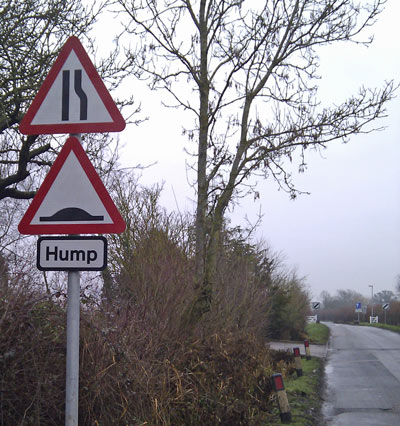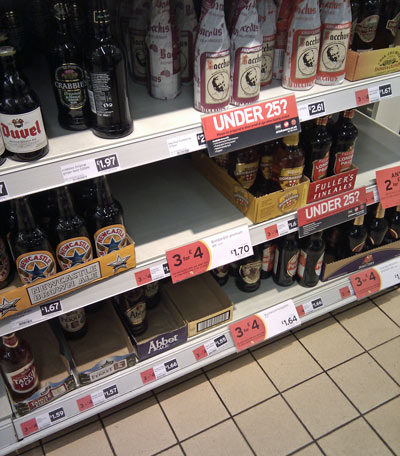The current snowy weather has exposed one of the most insidious aspects of how cheapskate companies have exploited the internet in the last decade or so — by outsourcing customer service to the customers themselves.
In normal circumstances, this can be quite empowering — rather than have to phone up a call centre or turn up in person the customer can cut out the intermediary and access information more directly. The classic example is travel — now everyone can access an airline or tour operator’s systems via the web rather than have to go into a high street travel agency. This also demonstrates why the internet isn’t really in itself such a paradigm-shifting technology — all it has really done is connect the devices that people use personally (computers and now phones and other innovations) with the commercial systems that organisations have been using internally to run their businesses since the 1970s or 80s.
In many call centre or customer service situations the person you interact with is really just there as a conduit to access the IT systems — and in the vast majority of cases this can be made user-friendly enough for a customer to do themselves over the web. And customers can now access information that previously wouldn’t have been cost-effective to pay employees to give out — like where exactly your train is meant to be on the line.
Even the likes of Twitter and Facebook aren’t really new — messaging services and bulletin boards have been in existence on private systems for decades.
Online shopping is an odd mixture between new technology and antidiluvian business processes — as Amazon and others have been discovering, parcel delivery is their Achilles heel. I’ve ordered Christmas presents from Amazon that, according to their whizzy, integrated tracking feature, have stayed in the Royal Mail’s distribution centre in Scotland since 9th December (12 days now).
No wonder Amazon tried to grow as big as quickly as it could because its basic business proposition is very unoriginal and easily copied — basically plugging web browsers into wholesalers’ catalogues. There’s little difference between Amazon’s bookshop and the old-style book clubs that offered members 4 books for £1 — just a more interactive catalogue.
Amazon has also set a very bad precedent in trying to handle all its customer service online. Phone numbers disappeared off their site as soon as they got big enough as a company to afford not to care too much about their customers. When they first started off in the UK around 1997, Amazon’s customer service was brilliant — I got several unsolicited free gifts. Try and contact them these days and all you get is some auto-generated reply and if you try and get something more personal you may be lucky and get an e-mail a few days later from someone in India with a very vague understanding of the problem.
In fact, every time I try to contact Amazon they annoy me so much that I don’t know why carry on using them. In fact I do — they’re cheap and their competitors, such as Waterstones, often can’t get their act together. I had a reading list of books to buy for a course and wanted to get them from Waterstones but their website kept being unavailable at the time.
Amazon has plainly gone for cost leadership and size — and if it’s customer service is irritating then it’s usually only some goods that have gone missing.
Plenty of cheap-skate companies inspired by penny-pinching, unimaginative managements have tried to use the internet principally as a means of cutting their own costs — thinking technology is a clever wheeze that would allow them to get the customer to do unpaid work that their own staff used to do. They can get away with this when processes are simple and straightforward but when things go wrong then this cynical attitude to the customer is ruthlessly exposed.
So airlines like BA have been encouraging passengers to use their own labour and materials to check-in and print out boarding passes so they can eliminate check-in desks at the airports and the staff that man them. It doesn’t seem to have occurred to Willie Walsh and his band of asset strippers that an airline, unlike Amazon, doesn’t just dispatch packages — it transports people — and these people need information, require food and accommodation when delayed and become very upset when they don’t get either and are piled up in airport lounges like a pile of delayed mail in a sorting office.
Also, pointing people to the web to get information in emergencies is useless because companies, both for reasons of cost and security, only expose the simplest and most straightforward functions of their IT systems via the internet. In a shop or call centre there’s almost always an ability to over-ride the simplest rules on the system — to allow a discount or impose a refund for example — because the company has given someone the authority to act with that discretion. This can’t be done in a self-service way.
So for complex interactions with its systems, a company always needs to have staff — but, because the vast majority of sales can often come online, these staff are seen as a necessary evil as they incur cost rather than generate revenue. Therefore they try and employ as few as possible.
BA asking its customers to rebook online is plainly ridiculous for a customer-facing business — how can customers self-prioritise their needs — for example distinguishing between passengers stuck in transit at Heathrow for four days as opposed to tourists jetting off for a bit of winter sun? Also many IT systems that are aimed at customers don’t get updated quickly enough to reflect exceptional operational circumstances — Chiltern Railways (who are way better at customer services than most train operators) were running an emergency timetable yesterday that bore no relation to that on the National Rail website.
People make the most ridiculous claims about the internet and the web and say how much it has changed everything — in the area of customer service I’d agree that it has had a big transformational effect — for the worse.

